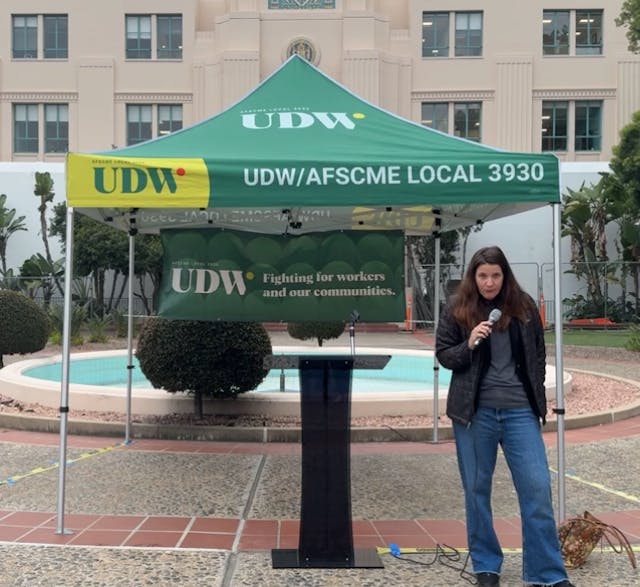Mexican Teachers Take to the Streets Again
Frontera NorteSur
Yuridia Garcia would like to get paid. A teacher in the southern Mexican state of Guerrero, Garcia was among tens of thousands of current and retired education workers who took to the streets last week in the states of Guerrero, Oaxaca, Michoacan, and Chiapas.
The protesters demanded overdue pay, job security, salary reclassifications and, as is the rallying cry of social movements across the nation, the safe return of the 43 forcibly disappeared students from the Ayotzinapa rural teachers’ college and the punishment of the parties responsible for the massive human rights violation.
As the week wore on, teachers conducted public demonstrations, blockaded avenues and highways, seized highway toll booths, occupied government offices, and shut down schools across a broad swath of southern and southwestern Mexico.
A protest sign left on a metal gate at state offices in Zihuatanejo perhaps summed up the local clamor: “We are missing 43, 12,300 job positions plus my salary.”
Stoking the Guerrero protests in particular was a delay in paying education workers half of their January salary, as well as non-payments or underpayments of annual Christmas bonuses and pensions. According to the Guerrero State Public Servants Union (SUSPEG), 12,300 families are at risk of losing their means of support.
Both the union and the Guerrero state government blame a good part of the problem on a federal education reform that recentralized payroll disbursements in Mexico City in addition to a mismatch in the lists of eligible workers held by the federal government and the actual number of employees working in schools and administrative offices.
In Zihuatanejo, scores of members of the SUSPEG and two other educator organizations, the SNTE and CETEG, staged a downtown march February 6 chanting “People we don’t want to bother you, but the government forces us to protest” and “Teachers united will never be defeated.” Personifying the widespread impact of the movement, the marchers represented educators from the Costa Grande municipalities of Jose Azueta (Zihuatanejo), La Union and Petatlan.
A fired-up crowd cornered interim Guerrero Governor Rogelio Ortega at the entrance to the local navy base, where Ortega was discussing security issues in the Costa Grande region of the state with military officials.
As tall marines hovered over the base’s entrance and heavily-armed state police guarded the flanks, Ortega dialogued with the protesters. Some marchers waved signs that blasted President Enrique Pena Nieto while a small group of demonstrators identifiying themselves as Atoytzinapa graduates held aloof a large banner demanding the presentation with life of their 43 colleagues and political trials for former Guerrero Governor Angel Aguirre and Luis Albarca, the ex-mayor of Iguala, Guerrero, who is jailed on charges related to the bloody police attack on the Ayotzinapa students in Iguala last September.
Dressed casually and maintaining a cool demeanor, Ortega fielded heated complaints from union leaders and education workers about the missing payments and the problem of workers who are not officially part of the budget but still work, in some cases enduring the situation for decades, according to protesters. Regarding the non-budgeted workers, one man urged the governor to take action on an “absurd situation on the part of the state government.”
Hailing from a family of education workers, Ortega sympathized with the protesters. “I know what it means to not have a bi-weekly paycheck,” he said. “Let’s work together in the last months I have as governor to resolve the problem.”
Ortega appealed on the protesters to understand his own situation. For example, he laid out his schedule for Friday, February 6, as consisting of a morning meeting in Zihuatanejo with military officials, a flight back to the state capital of Chilpancingo, an afternoon jaunt back to the Costa Grande to meet with the family of an Ayotzinapa student slain by police in 2011, and an evening meeting in Acapulco.
“You know the problem of security here in Guerrero in terrible,” Ortega prefaced his remarks. “I can’t attend to everything in the 24 hours of a day.” Set to leave office next October, Ortega pledged to head a working group to resolve the education workers’ petitions. He promised to meet again with movement activists at 8 pm the same evening in Acapulco.
“I’m with you all. I’m not going to leave you alone,” Ortega vowed. “We’re going to show that we can govern well during the last few months.” After posing for photos with several protesters, Ortega headed into the naval facility to meet with military commanders.
In a statement released the day prior to Ortega’s Zihuatanejo visit, the Guerrero State Education Secretariat (SEG) promised to pay all the education workers their salaries on Friday, February 6. The state education authorities said a Mexico City working group with participation from union, state government and federal officials was being assembled to tackle the payroll problem. The SEG appealed on the federal goverment to cover the workers’ pay.
“We reiterated that the payroll problem of the education sector in Guerrero is historic and it is urgent to resolve it with political will, always with respect for labor rights and in conformance with the budget assigned to the (state),” the SEG declared.
Ironically, the teacher pay problem comes at the very moment that the Pena Nieto administration is publicizing generous expenditures for its New Guerrero program, a campaign announced to alleviate poverty, social decomposition and environmental degradation in the southern state.
Obdulia Balderas knows a thing or two about historic education and social deficits in Guerrero. From about 1950 to 1985, Balderas worked as a primary and higher education teacher in different parts of the state, including a memorable stint in El Embarcadero, a small village not far from Acapulco. There she encountered a classroom that was a literal pig sty complete with animals sleeping inside. Balderas recalled telling parents she would not give lessons until the place was cleaned up and the pigs removed. The parents got to work.
“We held a parade to inaugurate the school,” Balderas said in an interview. Like many other Mexican teachers, Balderas got involved in movements for better educational conditions, labor rights, union democracy, and the defense of public education. She mentioned two important organizations that operated during her career, the Teachers Revolutionary Movement of the 1950s and the National Coordinator of Education Workers, founded in the 1970s but still wielding powerful influence in the central and southern regions of Mexico.
The retired teacher remembered an especially intense struggle that ensued in Guerrero during the late 1970s and early 1980s over state plans to obliterate the state university. At the time, Guerrero was governed by Ruben Figueroa, an important player in the Dirty War against government opponents.
“Ruben Figueroa began to smear us as guerrillas, communists,” Balderas said. “They began to disappear our companions. Many were tortured and some left the struggle..”
Yet, the movement persisted and succeeded in not only saving but expanding the educational offerings at the state university, according to the former educator.
Decades later, Balderas described how issues of labor rights, privatization and classroom conditions are still burning at the forefront of the public policy agenda. Unfortunately, she said, many people do not understand the educators’ movement and deride protesting teachers. “The people of town say, ‘Once more, the lazy teachers are not working’,” Balderas lamented.
Dividing her professional career between the state and federal sectors, Balderas had trouble getting all her years of service reconciled in a full retirement and only receives a partial pension of less than $300 per month.
“Do you think I can survive on that?” she asked.
Asked her opinion of the latest protests, Balderas was succinct: “I feel indignant, and I feel the injustice of the government toward the people. It’s not just one, it’s thousands of teachers and administrative workers.”






